The intelligence war is on. The hype surrounding ChatGPT-3 since its availability to the general public has acted like a shock within the ecosystem of technology giants. The tool’s ability to formulate clear, synthetic, and structured responses with disconcerting ease, as well as its aptitude for generating textual content, has pushed OpenAI’s competitors to highlight their in-house projects.
Google has now done just that with the presentation of Bard, its conversational AI-based robot. Google Bard is both a response to ChatGPT, a preemptive attack against Microsoft which plans to integrate this technology into its tools, but also (and above all) a vision of what search engines might become in a few months or years. Focus.
What is Google Bard?
In early February, Google unveiled its own conversational AI, accessible exclusively in closed beta for the moment. Like ChatGPT, Google Bard is a chatbot that uses conversational learning models to provide answers to the questions it is asked. Google presented it as a new service in its own right, capable of interpreting a request and generating, in return, a complete and structured response.
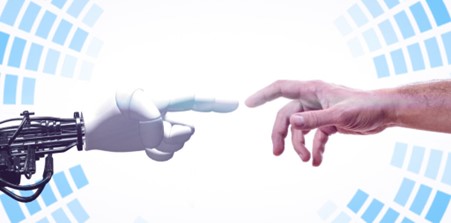
Since OpenAI made its innovative tool available to the general public, Google was expected to respond. It was clear that the Mountain View firm would not remain idle in the face of the tsunami caused by ChatGPT – with its 100 million users gained in just two months, according to a recent study. In the Big Tech world, it had long been said that Alphabet (Google’s parent company) was developing its own conversational agent nurtured by artificial intelligence.
For Google, it was more than time to come out of the woods, Microsoft having already announced the integration of ChatGPT into its search engine, Bing, in the coming months.
The sudden popularity of ChatGPT thus forced the American giant to show its teeth. While Google Bard remains more a promise at this stage, its announcement, through an official press release by CEO Sundar Pichai, as well as its unveiling in Paris on February 8, were significant events. However, this is just a stopover in a race that began several years ago.
Google and Artificial Intelligence
Indeed, Google is no novice in the field of artificial intelligence. The company has been developing projects around AI for six years, notably (but not only) at the R&D centre opened in Paris in 2018, where the February 8 presentation took place. In 2017, the company already introduced Transformer, a deep learning model used in the field of automated language processing.
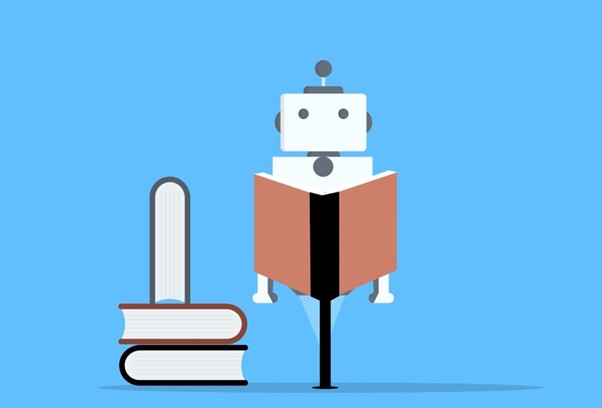
It is on this model that BERT, and then MUM were built: two algorithmic evolutions, integrated into the search engine, capable of better understanding natural language and the intentions of search queries, and of providing more pointed responses to complex requests, in a multitude of languages. The irony of the story is that the Transformer model is also used by… ChatGPT! (This is what makes Yann LeCun, the ‘Mr. AI’ at Meta, say that the underlying technologies of this tool are not as innovative as we are led to believe.)
In 2021, Google unveiled LaMDA (Language Model for Dialogue Applications), its revolutionary language model also built on Transformer. LaMDA was trained to dialogue, but also to pay attention to the context in which its responses are formulated, paving the way for Google Bard.
How Does Google Bard Work?
Google Bard combines the breadth of global knowledge with the power, intelligence, and creativity of large language models (Large Language Models). Like ChatGPT, it relies on machine learning models trained from a huge data corpus. Upon receiving a question or request from a user, the tool generates a clear, concise, and value-rich response, written in its own words.
For Google, Bard is intended to simplify complex subjects and formulate responses usable by the widest audience. In his statement, Sundar Pichai gives this example: he asks the app to list the discoveries made by the James Webb Space Telescope that he is likely to be able to explain to his 9-year-old child. The chatbot delivers a three-part response that is precise, useful, and tailored to the target.
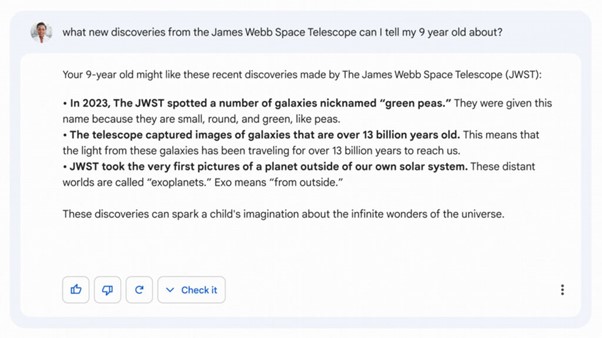
(Source: Google)
(Those of you paying close attention may have spotted a mistake in Bard’s response – we’ll address this point shortly.)
What is interesting is that this example was not chosen randomly. OpenAI specified that the database on which ChatGPT was trained stops in the middle of 2021, which means that any information subsequent to that cannot be used by the tool in its responses (unless it learned it by conversing with users). Since the James Webb Telescope was launched by NASA at the end of 2021, ChatGPT simply cannot answer a question on this subject. In doing so, Google highlights a significant difference between the two systems: unlike its counterpart, Bard is connected to the web, which allows it to draw on very recent data and provide users with more relevant information.
The other peculiarity of Google Bard is that it is powered by a ‘lighter’, less resource-intensive version of LaMDA. This makes the technology easier to deploy on a large scale, as it can be used by a greater number of people simultaneously. In view of future integration into the search engine, this is a detail that matters.
Google Bard and the Future of the Search Engine
This unveiling remains very elusive, all the more so as it is currently impossible to get your hands on Google Bard – only ‘trusted testers’ will be solicited by the firm to evaluate the tool. Moreover, Bard has already made mistakes and did so again, live, during its presentation in Paris (see here). This factual error, which credits the JWST with the first photo of a planet outside our solar system (when the actual first image dates from 2004), clearly shows that the tool is still in development and that its integration into the search engine is not imminent.
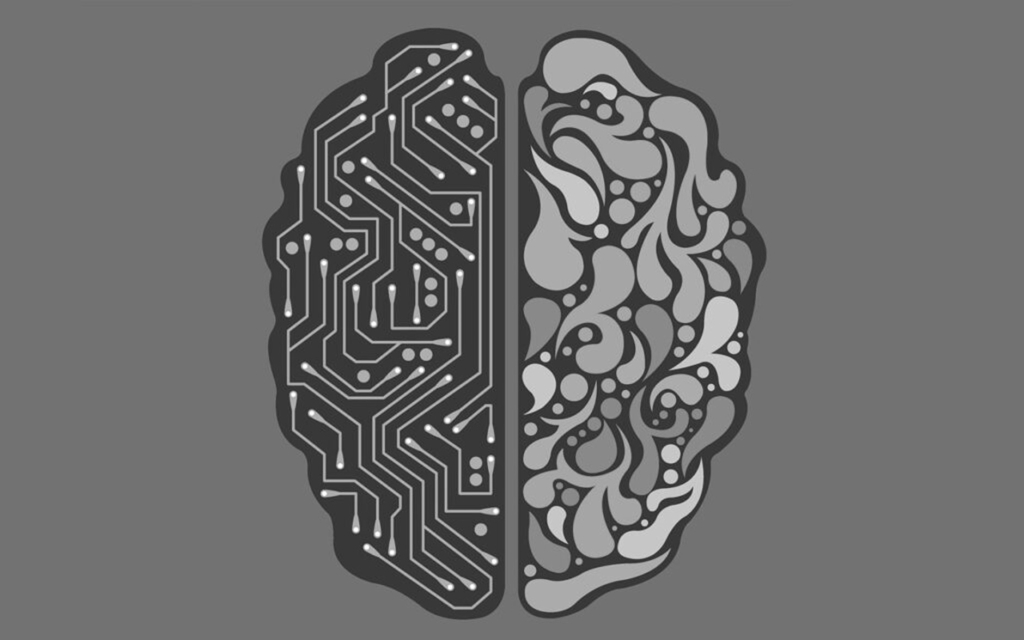
However, this AI war suggests what the future of Search might be like with the support of technologies like ChatGPT and Google Bard, notably by optimising the quality of enriched responses in the SERP.
Everything depends on the tool’s ability to produce structured and synthetic content based on a wide range of information. While Google’s enriched results most often display excerpts drawn from content selected on the Web or raw data, ChatGPT is able to reformulate this information to produce original content capable of precisely responding to the user’s request. It is this functionality that Microsoft seeks to implement in Bing, and it is also what Google plans with Bard.
The image below provides an idea of what the SERP could look like in the near future, enhanced by artificial intelligence. Faced with a complex request that requires comparing different data, the engine would provide a response synthesising the information drawn from the web, specifically written to meet the expressed need.
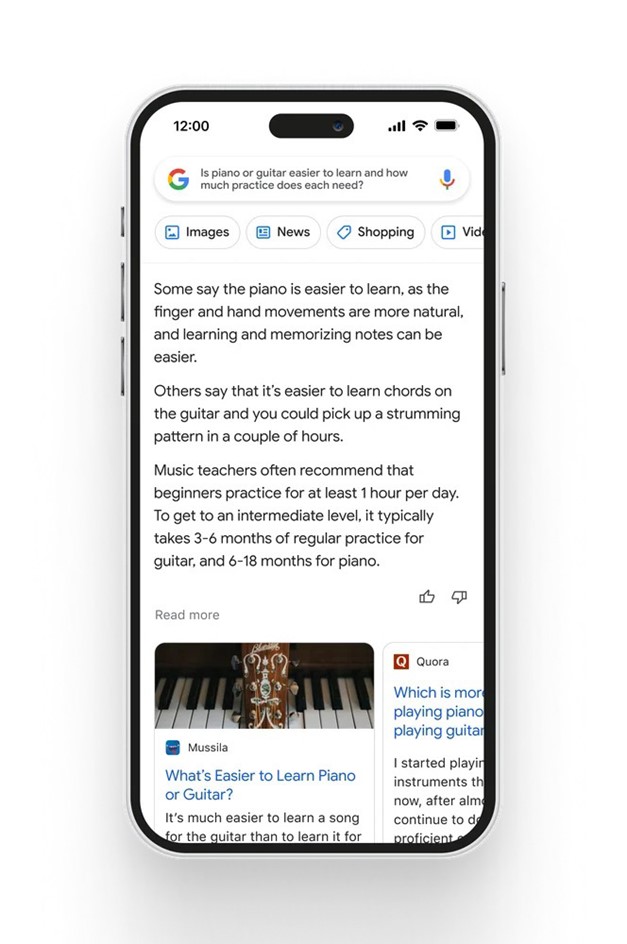
(Source: Google)
However, Google does not envision the future of Search as providing a single, definitive answer, the way ChatGPT currently does with certainty (and with substantial errors). The company instead intends to have both types of results coexist: on one side, text generated by artificial intelligence, and on the other, links to content deemed most relevant to the topic at hand – as is the case today. Some might say that this vision of the future is crucial for Google, which will do everything to maintain its advertising-based business model – and that’s absolutely true – but it’s also vital in terms of the free choice of users. This, in a context of a deluge of fake news, is not a trivial consideration.
After all, we all like to have choices … and it would be desirable that the advent of AI in search engines does not have the perverse effect of orienting (even more than now) users’ thinking towards the responses that the tool judges most suitable!
Google Bard is still in the state of promise. The firm remains cautious, and this is understandable in light of the many problems encountered by artificial intelligence applications over time (let’s remember that last year, Meta had to disconnect Galactica after three days of public access because the AI began to produce inappropriate content). The tool will have to be thoroughly tested and refined before being implemented anywhere. However, one thing is clear: the clash of the artificial intelligence titans has only just started.












